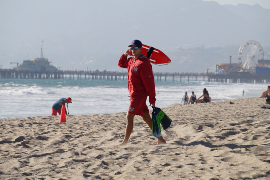Spotlights
Beach Attendant, Beach Lifeguard, Marine Safety Officer, Ocean Lifeguard, Ocean Lifeguard Specialist, Pool Attendant, Pool Lifeguard, Ski Patrol Paramedic, Ski Patroller, Beach Lifeguard, Pool Lifeguard, Water Safety Officer, Aquatic Safety Attendant, Head Lifeguard, Swimming Pool Supervisor
Lifeguards are the silent protectors of the water—keeping swimmers, surfers, and beachgoers safe every single day. Their main job is to prevent accidents and respond quickly during emergencies, ensuring that everyone can enjoy the water responsibly.
Whether they’re stationed at a public pool, a water park, or along a busy shoreline, lifeguards stay alert and focused, scanning the water for any signs of distress. They perform rescues, administer first aid or CPR, and educate the public about safety rules.
But being a lifeguard isn’t just about watching over swimmers—it’s about building confidence, promoting healthy recreation, and sometimes even saving lives! It’s a rewarding career for those who love water, teamwork, and helping people.
- Making a real difference by preventing injuries and saving lives.
- Working outdoors and staying physically active every day.
- Gaining valuable leadership, communication, and first aid skills.
- Building confidence and responsibility while helping the community.
- Forming strong teamwork bonds with fellow guards and aquatic staff.
Working Schedule
Lifeguards often work seasonal or part-time shifts, especially in outdoor facilities. Summer months and weekends are usually the busiest times. Some work year-round in indoor pools or aquatic centers. Hours can range from early mornings to evenings, depending on public swim schedules.
Typical Duties
- Monitor swimming areas and enforce safety rules.
- Recognize and respond to swimmers in distress.
- Perform water rescues and administer CPR or first aid when needed.
- Check water conditions, depth, and equipment daily.
- Maintain cleanliness and safety of the pool deck or beach area.
- Report incidents, accidents, and maintenance issues to supervisors.
Additional Responsibilities
- Teach swim lessons or lead water safety workshops.
- Set up and remove safety equipment before and after shifts.
- Assist with pool opening and closing duties.
- Communicate clearly with guests, parents, and co-workers.
- Participate in regular emergency drills and physical fitness training.
A lifeguard’s day often starts early with a pool inspection or beach patrol, checking the water’s temperature, clarity, and safety gear. As swimmers arrive, the guard takes their post—scanning the water constantly, ready to react in seconds if needed!
During quieter moments, lifeguards may teach swimming lessons, review emergency procedures, or test rescue skills with their team. They stay hydrated and alert, rotating stations regularly to maintain focus.
If an emergency happens, everything else stops—swift action, steady hands, and calm thinking take over. By the end of the day, after clearing the pool and noting any incidents, there’s satisfaction in knowing they kept everyone safe.
Soft Skills
- Alertness and quick decision-making
- Strong communication and leadership
- Responsibility and dependability
- Calmness under pressure
- Empathy and teamwork
- Observation and attention to detail
Technical Skills
- CPR and First Aid certification
- Water rescue techniques
- Use of lifesaving equipment (buoys, rescue tubes, AED)
- Basic knowledge of water safety regulations
- Swimming proficiency and endurance
- Crowd and risk management
- Pool Lifeguard – Supervises swimming pools and indoor aquatic centers.
- Beach Lifeguard – Patrols open-water areas like oceans, lakes, or rivers.
- Waterpark Lifeguard – Monitors slides, lazy rivers, and wave pools.
- Head Lifeguard / Supervisor – Oversees staff scheduling, training, and emergency response coordination.
- Aquatics Instructor-Lifeguard – Combines lifeguarding with teaching swimming lessons.
- Municipal or private swimming pools
- Beaches and coastal resorts
- Cruise ships and waterparks
- Fitness centers and schools
- Hotels and recreational clubs
- Summer camps and youth programs
This job requires constant focus and physical stamina—even during long, hot hours. Lifeguards must stay alert at all times, as seconds can make the difference between life and death. They may work on weekends, holidays, or in unpredictable weather conditions.
But the rewards are unmatched—you become a protector, a role model, and a leader who helps others enjoy the water safely.
- Increased Safety Training: More facilities now require advanced rescue and AED certifications.
- Technology Integration: Drones and underwater sensors assist lifeguards in monitoring swimmers.
- Lifeguard Shortages: High demand means certified guards can often choose from multiple job offers.
- Youth Development: Lifeguarding programs now serve as steppingstones to careers in healthcare, fitness, and public safety.
Future lifeguards often loved swimming, sports, or outdoor activities. They might have been on swim teams, enjoyed helping others, or taken leadership roles in camps or recreation clubs. Many were the “go-to” friends who stayed calm during emergencies or challenges.
To become a Lifeguard, the path often begins with strong swimming skills and a passion for helping others. While a high school diploma or GED is generally preferred, the most important requirements are lifeguard certification and first aid training from accredited organizations such as the American Red Cross, YMCA, or Ellis & Associates.
Most lifeguards start by participating in Junior Lifeguard programs or taking advanced swimming lessons before completing a formal certification course. Experience in swimming, water safety, or team sports can be a big advantage when applying for your first job.
On-the-Job Training
- New lifeguards usually receive orientation and safety briefings before taking full responsibility for a post.
- Training focuses on rescue techniques, communication procedures, and emergency response drills.
- Supervisors often conduct mock rescues and CPR practice to keep staff prepared.
- Ongoing refreshers are required to maintain physical fitness and skill readiness throughout the season.
Optional Certifications
- Lifeguard Certification (American Red Cross, YMCA, or Ellis & Associates – required for most jobs)
- CPR and First Aid Certification (required and renewed every 1–2 years)
- Water Safety Instructor (WSI) – for those interested in teaching swimming lessons.
- AED (Automated External Defibrillator) Certification – valuable for handling cardiac emergencies.
- Pool Operator Certification – helpful for those planning to advance into supervisory or management roles.
- Join a swim team or take advanced swimming lessons.
- Take health, physical education, and first aid courses.
- Volunteer at community pools, beaches, or youth summer camps.
- Get CPR and First Aid certified early.
- Participate in Junior Lifeguard programs.
- Practice leadership by coaching or assisting swim classes.
- Stay physically fit with regular endurance and strength training.
- Explore part-time or summer jobs in recreation or hospitality.
- Certification from a recognized organization (American Red Cross, YMCA, Ellis & Associates).
- Hands-on practice in real aquatic settings.
- Instructors certified in emergency response.
- Opportunities for job placement or internship after training.
Sample Programs:
- American Red Cross Lifeguard Certification
- YMCA Lifeguard Training Course
- Ellis & Associates International Lifeguard Training Program
- Search for openings on sites like Indeed, LinkedIn, YMCA.org, RedCross.org, or your city’s Parks and Recreation website. Many community pools, resorts, and beaches start hiring months before summer begins, so apply early!
- Entry-level roles to look for: pool attendant, junior lifeguard, swim instructor assistant, recreation aide, or beach patrol trainee.
- Gain experience by volunteering at local pools, youth camps, or swimming lessons. Even helping with kids’ swim classes or water safety events can show commitment to the field.
- Learn the basics of customer service, communication, and teamwork—lifeguards are not just rescuers, they’re also public safety ambassadors who guide and educate swimmers.
- Build connections with swim coaches, aquatic supervisors, or certified lifeguards who can refer you for seasonal jobs or mentor you during training.
- Stay current with safety regulations, weather protocols, and facility rules so you can speak confidently during interviews.
- Dress professionally for interviews and show a calm, responsible attitude—employers value maturity and reliability above all.
- Practice interview questions about how you’d respond in emergencies or manage large crowds calmly and effectively.
- Keep your CPR, First Aid, and Lifeguard certifications up to date—many employers require proof before hiring.
- Finally, prepare references from swim instructors, coaches, or volunteer coordinators who can vouch for your skills, character, and leadership potential.
- Gain experience and apply for Head Lifeguard or Aquatics Supervisor roles.
- Obtain Lifeguard Instructor Certification to train new guards.
- Learn pool operations, maintenance, and safety management.
- Earn degrees in Recreation Management, Sports Science, or Emergency Services.
- Take courses in leadership, customer service, and first aid instruction.
- Attend safety workshops and aquatic leadership conferences.
- Transition into roles like Aquatic Director, Recreation Manager, or Swim Coach.
Websites
- RedCross.org/Lifeguarding
- YMCA.org
- EllisAndAssociates.com
- AmericanLifeguard.com
- National Recreation and Park Association (NRPA.org)
- Indeed.com
- USAJobs.gov (for park and military base lifeguards)
- CareerOneStop.org
- O*NET OnLine
Books
- The Complete Lifeguard Manual by American Red Cross
- Aquatic Rescue Techniques by B. Ellis
- Water Safety Instructor Guide by YMCA of the USA
Lifeguards play a vital and rewarding role in keeping swimmers and beachgoers safe, though their work often goes unnoticed—especially when everything runs smoothly. While it might seem like a simple summer job, being a lifeguard requires skill, focus, and quick thinking. Employment for lifeguards is expected to remain steady over the next decade, with opportunities at pools, beaches, and resorts continuing to grow. If you’re interested in similar careers that also involve safety, fitness, or helping others, check out the list below!
- Swim Instructor
- Fitness Trainer
- Emergency Medical Technician (EMT)
- Park Ranger
- Physical Education Teacher
- Recreation Leader
- Coast Guard Member
- Camp Counselor
Newsfeed

Featured Jobs

Online Courses and Tools

Annual Salary Expectations
New workers start around $34K. Median pay is $36K per year. Highly experienced workers can earn around $38K.






